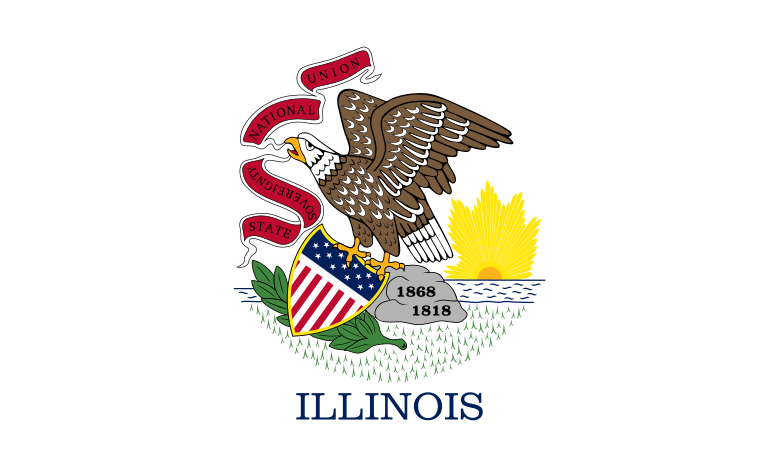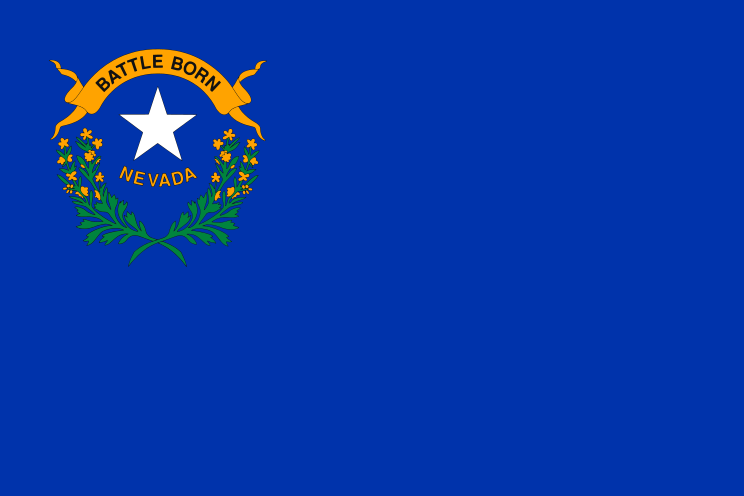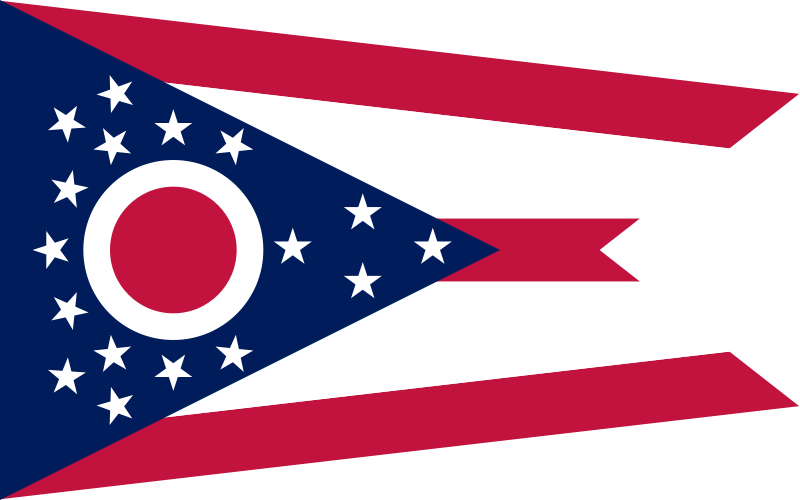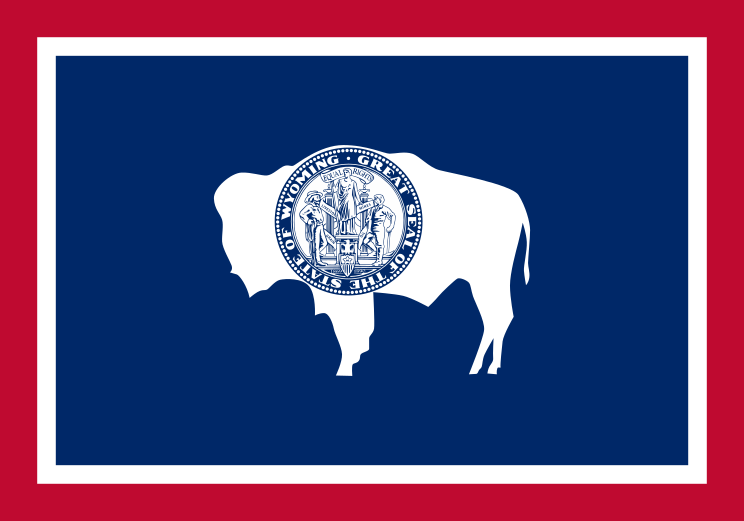most readers will know that Jill and i belong to The Church of Jesus Christ of Latter-day Saints, otherwise known as the Mormon church. when we were in Taiwan we attended a small branch of about 50 people, all of whom were English speaking, but here there is no such congregation available, despite Nagoya being almost twice as big as Taichung. so we travel all the way across town to attend the Japanese speaking Meito Ward, but we have made some good friends and had some good times there.

thejayfather himself before the sign on the Meito Ward chapel, which is the stake center for the Nagoya East Stake. the sign says, approximately, Matsu Jitsu Sei-to Iesu Kirisuto Kyo Kai, the name of the church in Japanese.
some weeks ago we began helping the missionaries to teach their English conversation class, called Eikaiwa, which is held on Wednesday nights at the chapel. after class there are sometimes people playing badminton or volleyball in the cultural hall, and joining in with these games is how we met the young lads pictured below, Shinji and Junta. when we first played badminton with them they appeared to be deeply suspicious of us, or nervous at least. since then we have played a few times and have finally even figured out the bizarre scoring system they use, which would be slightly mysterious even without a language barrier. in any case, now they are our very great friends, though we still can't say more than a very few words to them, nor them to us. every Sunday finds them diligently searching for us and emerging with wide grins on their faces as they greet us and enthusiastically pump our hands. then a round of inquiries into health ensues, "o-genki desu-ka?" "Hai, genki desu," which is followed by a few minutes of enthusiastic head-bobbing.
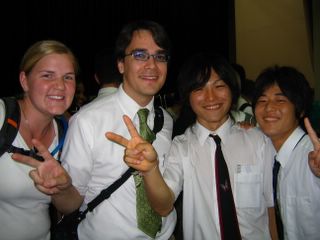
Jill and i with our badminton buddies, Shinji and Junta, all making the requisite "V" sign.
a few weeks ago we did get a welcome break from the language barrier at church, however. a small group from the Polynesian Cultural Center in Laie, Hawaii, came to do an evening show called a fireside, in which they danced and sang in a variety of Polynesian styles and languages. each of the performers, like the one below, who is Samoan, also spoke a few words, in English, that were translated for the assembled Japanese audience. it was very nice to be able to get the jokes before the translational delay, but it's kind of a strange sonic effect to hear the main body of laughs seconds later.

Jill and i with a Samoan (i think) performer from the PCC.
then last week the Meito Ward was visited by a general authority of the church and his wife from Korea, a President Ko. we were hoping for the ultimate in translational nightmares: them speaking Korean, which would be translated into Japanese at the pulpit, which would then be translated into English by one of the missionaries for us to hear on our headsets, which last is how we usually take in the meting. unfortunately, we were deprived of this long linguistic loop due to the Kos speaking quite good English, but it was fun to think about anyway. later, since we had earlier been asked to serve as advisors to the young single adults in the ward, we were set apart to that calling by a counselor in the bishopric--in Japanese. it was very strange to have a blessing given in a foreign language, being whisper translated by one of the people participating in giving the blessing. The calling itself will involve some fun language problems, but thanks to the church placing an emphasis on its Japanese missionaries learning English while they are serving, even in Japan, we should have plenty of translators available. it's weird too that we're being asked to advise those whose ranks we've only just left, because in the States they typically call a much more, well, seasoned couple to that role. still, given that we don't have a phone, we might be kind of hard to get hold of for advice, translated or otherwise.

thejayfather himself before the sign on the Meito Ward chapel, which is the stake center for the Nagoya East Stake. the sign says, approximately, Matsu Jitsu Sei-to Iesu Kirisuto Kyo Kai, the name of the church in Japanese.
some weeks ago we began helping the missionaries to teach their English conversation class, called Eikaiwa, which is held on Wednesday nights at the chapel. after class there are sometimes people playing badminton or volleyball in the cultural hall, and joining in with these games is how we met the young lads pictured below, Shinji and Junta. when we first played badminton with them they appeared to be deeply suspicious of us, or nervous at least. since then we have played a few times and have finally even figured out the bizarre scoring system they use, which would be slightly mysterious even without a language barrier. in any case, now they are our very great friends, though we still can't say more than a very few words to them, nor them to us. every Sunday finds them diligently searching for us and emerging with wide grins on their faces as they greet us and enthusiastically pump our hands. then a round of inquiries into health ensues, "o-genki desu-ka?" "Hai, genki desu," which is followed by a few minutes of enthusiastic head-bobbing.

Jill and i with our badminton buddies, Shinji and Junta, all making the requisite "V" sign.
a few weeks ago we did get a welcome break from the language barrier at church, however. a small group from the Polynesian Cultural Center in Laie, Hawaii, came to do an evening show called a fireside, in which they danced and sang in a variety of Polynesian styles and languages. each of the performers, like the one below, who is Samoan, also spoke a few words, in English, that were translated for the assembled Japanese audience. it was very nice to be able to get the jokes before the translational delay, but it's kind of a strange sonic effect to hear the main body of laughs seconds later.

Jill and i with a Samoan (i think) performer from the PCC.
then last week the Meito Ward was visited by a general authority of the church and his wife from Korea, a President Ko. we were hoping for the ultimate in translational nightmares: them speaking Korean, which would be translated into Japanese at the pulpit, which would then be translated into English by one of the missionaries for us to hear on our headsets, which last is how we usually take in the meting. unfortunately, we were deprived of this long linguistic loop due to the Kos speaking quite good English, but it was fun to think about anyway. later, since we had earlier been asked to serve as advisors to the young single adults in the ward, we were set apart to that calling by a counselor in the bishopric--in Japanese. it was very strange to have a blessing given in a foreign language, being whisper translated by one of the people participating in giving the blessing. The calling itself will involve some fun language problems, but thanks to the church placing an emphasis on its Japanese missionaries learning English while they are serving, even in Japan, we should have plenty of translators available. it's weird too that we're being asked to advise those whose ranks we've only just left, because in the States they typically call a much more, well, seasoned couple to that role. still, given that we don't have a phone, we might be kind of hard to get hold of for advice, translated or otherwise.







































